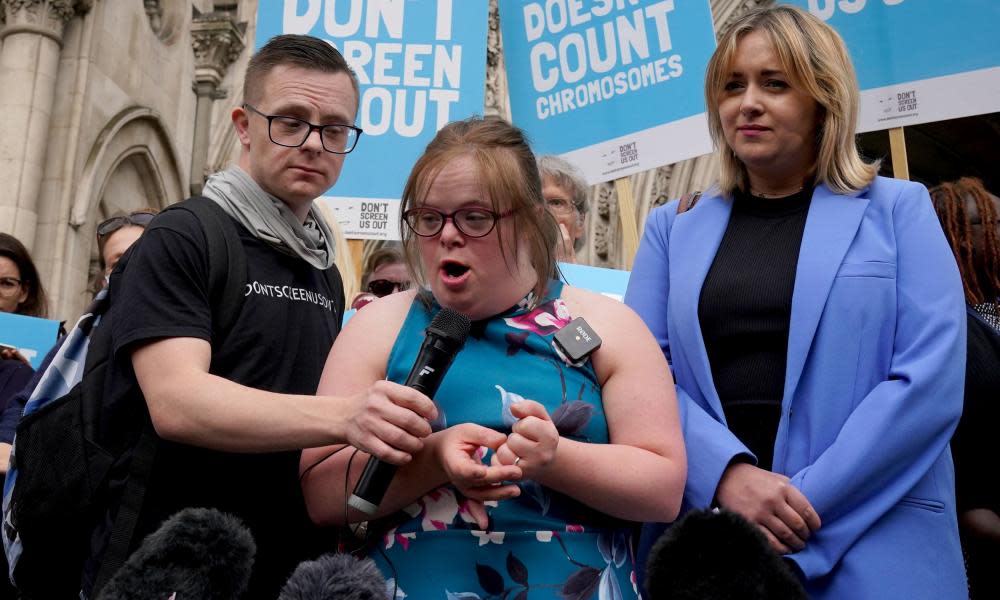Woman with Down’s syndrome loses UK abortion law case

A woman with Down’s syndrome who took Sajid Javid to court over the UK’s abortion law has lost her case in the high court.
Heidi Crowter, who brought the case alongside Máire Lea-Wilson, whose son Aidan has Down’s syndrome, and a child with Down’s syndrome identified only as A, had argued that allowing pregnancy terminations up to birth if the foetus has Down’s syndrome is discriminatory and stigmatises disabled people.
They challenged the Department of Health and Social Care over the Abortion Act 1967, which sets a 24-week time limit for abortions unless there is “substantial risk” of the child being “seriously handicapped”. At a two-day hearing in July they argued it interfered with the right to respect for private life in article 8(1) of the European convention on human rights (ECHR), including the decision to become or not to become a parent and “rights to dignity, autonomy and personal development of all three claimants”.
But in a ruling on Thursday [pdf] their case was dismissed by two senior judges, who ruled that the legislation was not unlawful and aimed to strike a balance between the rights of the unborn child and of women.
Lord Justice Singh and Mrs Justice Lieven said: “The issues which have given rise to this claim are highly sensitive and sometimes controversial. They generate strong feelings, on all sides of the debate, including sincere differences of view about ethical and religious matters. This court cannot enter into those controversies; it must decide the case only in accordance with the law.”
Crowter said it was a “sad” day but vowed to keep on fighting. Speaking alongside her husband, James Carter, outside the Royal Courts of Justice, she said: “The judges might not think it discriminates against me, the government might not think it discriminates against me, but I’m telling you that I do feel discriminated against and the verdict doesn’t change how I and thousands in the Down’s syndrome community feel.”
During the hearing Jason Coppel QC, representing the claimants, told the high court Down’s syndrome was the single largest justification for “late-term abortions” under the Abortion Act.
The judges said the evidence they had heard “powerfully” showed that there were families who positively wished to have a child even if they would have severe disabilities, but not every family would react that way.
They added: “[T]he ability of families to provide a disabled child with a nurturing and supportive environment will vary significantly. The evidence is also clear that, although scientific developments have improved and earlier identification may be feasible, there are still conditions which will only be identified late in a pregnancy, after 24 weeks.”
The judges said women other than the claimants could see their “choices […] curtailed (and potentially made criminal)”.
The ruling stated: “There is powerful evidence before this court of families which provide a loving environment to children who are born with serious disabilities but we do not know what would happen, in a counterfactual world, in which some women have been compelled by the fear of the criminal law to give birth to children who will not be loved or wanted.”
The issue was better debated in parliament than dealt with in litigation, they said.
Lea-Wilson said: “Today’s high court judgment effectively says that my two sons are not viewed as equals in the eyes of the law. People with Down’s syndrome face discrimination in all aspects of life, with the Covid pandemic really shining a light on the dangerous and deadly consequences this can have.”
She said the ruling condoned discrimination and would cement the belief in society that the lives of people with Down’s syndrome were not as valuable. She said she did not regret bringing the case because it had “helped raise awareness around the wonderful lives people with Down’s syndrome and their families lead”, and had helped to dispel some negative stereotypes.
Crowter compared the claimants’ battle to William Wilberforce’s fight against slavery. “[W]hen the going got tough, he kept going, and I’m going to do the same, because I want to succeed in changing the law to stop babies like me … being aborted up to birth, because it’s downright discrimination,” she said. “I’m not giving up, let’s do this.”

 Yahoo Movies
Yahoo Movies 
